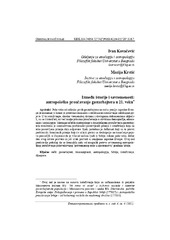Приказ основних података о документу
Između istorije i savremenosti - antropološko proučavanje gastarbajtera u 21. veku
Between history and modernity: The anthropological study of migrant workers in the 21s t century
| dc.creator | Kovačević, Ivan | |
| dc.creator | Krstić, Marija | |
| dc.date.accessioned | 2021-10-12T11:19:00Z | |
| dc.date.available | 2021-10-12T11:19:00Z | |
| dc.date.issued | 2011 | |
| dc.identifier.issn | 0353-1589 | |
| dc.identifier.uri | http://reff.f.bg.ac.rs/handle/123456789/1216 | |
| dc.description.abstract | Pola veka od odlaska prvih gastarbajtera na rad u zemlje zapadne Evrope je momenat u kome je potrebno rezimirati i refokusirati istraživanja celokupne pojave. U to istraživanje, shodno vremenskoj distanci i dostupnim dokumentima uključili, su se i istoričari, uz već ranije prisutna proučavanja u okvirima demografije, ekonomije i sociologije. Skromno učešće antropologa u dosadašnjem proučavanju gastarbajtera rezultiralo je siromaštvom problemski postavljenih pitanja i istraživanja koja na tako postavljena pitanja daju odgovore. Ipak, potrebno je definisati koji su to pravci problemski formiranih pitanja koji će učiniti prelaz sa deskripcije na tumačenje pojava proizašlih iz činjenice da je više od milion ljudi iz Srbije, tokom pola veka, dobar deo svog života provelo ili još uvek provodi u zemljama zapadne Evrope. Ovaj rad predstavlja pokušaj da se formulišu neki od mogućih puteva savremenog antropološkog proučavanja poluvekovnog 'privremenog rada u inostranstvu' građana Srbije. | sr |
| dc.description.abstract | Half a century after the first migrant workers left to find labor in the countries of Western Europe comes the moment in which it is necessary to summarize and refocus the research into this phenomenon. The research effort has - in accordance with temporal distance and accessible documents - been joined by historians, on top of previously existing research conducted within the frameworks of demography, economy and sociology. The modest participation of anthropologists within studies of migrant workers up to the present has resulted in a scarcity of critical research questions and studies which would provide answers to them. Some issues were missed due to non-functional focusing on immigration and national minorities in neighboring countries, and can now only be studied within the context of historical anthropology. Still, it is necessary to define the directions which new research questions should take in order to make the transition from description to interpretation of phenomena stemming from the fact that over a million people from Serbia, over the last half century, have spent, or still spend a large portion of their lives working in Western European countries. This paper represents an attempt to formulate some of the possible paths contemporary anthropological research could take in the study of the semi centennial 'temporary labor abroad' of Serbian citizens. | en |
| dc.publisher | Univerzitet u Beogradu - Filozofski fakultet - Odeljenje za etnologiju i antropologiju, Beograd | |
| dc.relation | info:eu-repo/grantAgreement/MESTD/Basic Research (BR or ON)/177017/RS// | |
| dc.relation | info:eu-repo/grantAgreement/MESTD/Basic Research (BR or ON)/177035/RS// | |
| dc.rights | openAccess | |
| dc.rights.uri | https://creativecommons.org/licenses/by/4.0/ | |
| dc.source | Etnoantropološki problemi | |
| dc.subject | transmigranti | sr |
| dc.subject | Srbija | sr |
| dc.subject | istraživanje | sr |
| dc.subject | gastarbajteri | sr |
| dc.subject | dijaspora | sr |
| dc.subject | antropologija | sr |
| dc.subject | transmigrants | en |
| dc.subject | Serbia | en |
| dc.subject | migrant workers | en |
| dc.subject | identity | en |
| dc.subject | diaspora | en |
| dc.subject | anthropology | en |
| dc.title | Između istorije i savremenosti - antropološko proučavanje gastarbajtera u 21. veku | sr |
| dc.title | Between history and modernity: The anthropological study of migrant workers in the 21s t century | en |
| dc.type | article | |
| dc.rights.license | BY | |
| dc.citation.epage | 982 | |
| dc.citation.issue | 4 | |
| dc.citation.other | 6(4): 969-982 | |
| dc.citation.rank | M24 | |
| dc.citation.spage | 969 | |
| dc.citation.volume | 6 | |
| dc.identifier.doi | 10.21301/eap.v6i4.8 | |
| dc.identifier.fulltext | http://reff.f.bg.ac.rs/bitstream/id/204/1213.pdf | |
| dc.type.version | publishedVersion |

